- Home
- Megan Bryce
The Reluctant Bride Collection Page 44
The Reluctant Bride Collection Read online
Page 44
Honora Kempe fumed for seven days.
Miss Letitia Blackstock was asked multiple times over the course of the week if she was quite well. She snapped at her intended and insulted anyone who got near her, and Honora eventually quarantined herself.
And then she was forced to suffer her aunt and uncle tiptoeing around and whispering in hallways.
Honora squeezed her fist and shouted, “I can hear you!”
They poked their heads around the corner and Aunt Gertrude said softly, “The stress has got to you, my dear. Perhaps it was too soon to jump into the fray again. We should have waited, given you time to rest.”
“It is too late now. We shall simply have to wait until Mr. Moffat decides he has had enough and pays us off.”
Uncle Hubert muttered, “Shouldn’t be too long now.”
Aunt Gertrude patted her husband’s arm. “Is that your plan then? To use this ill temper to force his hand?”
It hadn’t been her plan. She hadn’t had a plan, yet.
But she’d had five engagements broken and had never floundered for a reason for ending it yet.
Gentlemen, or at least those who thought of themselves as gentlemen, were willing to preserve the illusion of honor at any cost.
Uncle Hubert noted, “He hasn’t been round in two days. You’ve scared him off.”
“I told him I was not feeling well and I would send a note when I was better.”
Her aunt and uncle exchanged a look, then came all the way into the room.
Honora sat down and traced the pattern of the sofa with her thumb, and her aunt sat next to her.
“It might be for the best, dear, if you never sent that note. End this one, and we’ll go have a rest. Be ourselves for a little while.”
“It’s too soon to end it. We’ve only been engaged for a month. We’ll just have to use this foul temper to our advantage. Miss Letitia Blackstock will be her old happy self again tomorrow, and then in another month, I’ll let Honora out and we can end this charade for good.”
Another month of being Miss Letitia Blackstock, and Honora could feel her temper bubbling and boiling.
Perhaps her aunt was right and they’d rushed into this one. Honora couldn’t explain why this persona chafed so but Miss Blackstock was getting on her last nerve.
She stood restlessly. “I am going to my lecture.”
“Shall I go with you, my dear?” And when Honora shook her head, her aunt continued, “I don’t know why steam interests you so.”
Miss Blackstock would have explained, again.
But Honora simply said, “I know,” and left the room.
Honora was late to the lecture– a carriage had overturned, blocking the road– and when she finally left her maid to wait outside the hall and quietly tiptoe inside, her temper and frustration gnawing at her, someone was sitting in her seat.
She stopped and glared at the offending gentleman.
Mr. St. Clair shifted in his seat and tried not to smile, and Honora turned her glare to him.
His eyes tipped up to look at her, yes, twig hat, and then he moved his walking stick from off the seat next to him and turned his attention back to the lecture.
Honora sat. And when Mr. St. Clair held out his leaflet to her, she took it without a word.
Mr. St. Clair leaned toward her and whispered, “Your hat is quivering.”
Honora took a calming breath, opening the leaflet and willing her temper away. And then she laughed softly because she was sitting next to Mr. St. Clair and her temper wouldn’t be improved with the experience.
But he said not another word and neither did she, and when the lecturer left the podium at the end, Honora was herself again.
Or as close to it as she could get while not actually being herself.
Mr. St. Clair held his hand out to Honora and she stared at it. “Er, yes?”
“The leaflet.”
“Ah. Thank you for the use of it.”
“You may be able to get another if you ask nicely.” He glanced at her hat. “Or perhaps not.”
She turned her head to look at him and his eyes were close. And gray. And amused.
“If I was wearing my other hat, I could probably get yours from you.”
“I doubt it.”
She did, too. But, “You simply can’t imagine how men fall for a few flowers.”
“Mm-hm.”
He folded the paper, putting it inside his coat, and Honora asked, “Did you save this seat for me?”
“I didn’t. But when I saw you getting ready to attack the poor gentleman who’d unwittingly sat in your favored spot, I decided I would rather hear the lecture. You were already causing a commotion by being late.”
She smiled slightly. “A carriage overturned. You can hardly fault me for that.”
“I can. I did. I will.”
She rose and he followed her as she headed to the exit.
“Next week, I trust, I will be able to hear the entire lecture. A man should be able to expect that at least once.”
“You’ve already had your once. Last week.”
“Then once more, if you please, Miss Twiggy Blackstock. Next week is the final lecture.”
Honora reared back. “Twiggy?”
“Your alternate ego is Miss Apple Blossom Blackstock.”
She laughed, shaking her head as they exited the hall together. She spotted her maid and waved her over, and said, “Should I wear the other hat next week?”
“I can’t imagine why you would.”
He turned away from her after a quick head nod and Honora said to his retreating back, “No, I can’t imagine why either.”
Reparations were in order for Mr. Moffat, and Honora was forced to do what women had been doing since time immemorial.
She baked him a tart.
Of course, she burnt it, and she thought that if Mr. Moffat didn’t get scared off because of her temper, her cooking might just do it.
Mr. Moffat’s wife would have to know how to cook, at least occasionally, and Honora was convinced that that was one skill that needed to be learned while young or else it just never took.
She’d thought about bribing Aunt Gertrude’s cook to make a tart, then decided the truth might be better after all.
She packed a picnic basket and invited Mr. Moffat and Uncle Hubert and Aunt Gertrude and put on her Miss Apple Blossom hat.
They trudged through Victoria Park and when she found a suitable place, bade Mr. Moffat to lay down the blanket in as sweet a voice as she could muster.
It must have been good enough because Mr. Moffat smiled at her and they settled, Honora pulling out bread and boiled chicken and lemonade.
She waited until they had lunched, and then with a flourish pulled out her burnt strawberry tart with a bright smile.
She cut it up, placing it carefully on little plates, and when she passed Mr. Moffat his, said shyly, “A sweet treat to make up for my sour temper. Forgive me?”
Mr. Moffat said, “Of course, of course,” as he looked at the tart with a frozen smile on his face.
Honora took a big bite of her own and said with obvious satisfaction, “Why, I think this is the best tart I’ve ever made. I remembered the sugar this time!”
Uncle Hubert choked and Miss Blackstock, ever solicitous, poured him more lemonade.
Aunt Gertrude got into the spirit of it and said, “You do not make the same mistake twice, Letitia, at the very least. This tart is a vast improvement, although a tad on the overdone side.”
“Well, only a little. But I like my tarts well done. Don’t you, Mr. Moffat?”
Mr. Moffat rapped his fork on the crust and finally said, “Er, yes. Wonderful, wonderful.”
The next week, having learned her lesson about carriages and traffic, Honora was early to the lecture. And when she sat down, it was next to Mr. St. Clair again.
He looked at her. “You’re not getting attached to me, are you?”
“I’m engaged.”
He gr
unted. “Engaged is not married.”
Honora thought no truer words had ever been spoken.
She said, “But you were relieved when I brought Mr. Moffat, weren’t you?”
“Astounded was more like it. There should be some form of address for engaged women so as to warn a fellow. Not a miss, not yet a missus, but something in between.”
“That is absurd. And unfair. You were born a mister, and there you’ll stay. Whereas my very name, my very being, is dependent on whether I’m married or not.”
“It’s not about being fair, it’s about keeping civilization going. A man needs to know if a woman is taken when he first meets her or else all hell would break loose.”
“You’re joking.”
“No. A man needs to know at the first introduction so he stays away from another man’s territory. A woman doesn’t.”
Honora realized her mouth was hanging open and she closed it with a snap.
“What you’re saying is that a woman’s form of address is there simply to let a man know whether she is available or not? Fascinating.”
He shrugged. “If your fiancé hadn’t introduced us, you would have worked it in somehow that you were engaged. Isn’t a form of address so much simpler?”
“I do believe I could have made it clear that I wasn’t a possibility for you without resorting to my fiancé. But you are right about one thing. A woman doesn’t need a man’s form of address to tell her whether he’s married or not. You’re not.”
“You don’t know that. I could be married with four children and you wouldn’t ever know.”
“I know. You’re not. And I think it unlikely you ever will be.”
“Would that I was so lucky.”
The lecturer took his place behind the podium and Mr. St. Clair leaned over to whisper, “Because I think that your Mr. Moffat, like all men, is in for a world of trouble once he says ‘I do’.”
Honora thought that if she really was going to marry Mr. Moffat, that was probably true.
Mr. Moffat looked, last time Honora had seen him, like he was beginning to realize that as well.
But it was going to take more than burnt tart and a bad temper to get him to break the engagement.
Honor. Bah.
Honora pushed every problem from her mind and listened as the lecturer waxed eloquently about what steam might bring them. Faster trains and ships. More goods and foreign foods from halfway around the world.
The impossible not only possible but already happening.
She glanced at Mr. St. Clair and knew that he saw it, too. The future.
She smiled at the curmudgeon, then turned back to the lecturer and imagined what steam would bring them.
When the lecturer stepped down from the podium and the audience had stopped clapping, Honora sighed.
“I will miss these lectures. You notwithstanding.”
Mr. St. Clair gathered his walking stick. “Why? What is it about steam and coal and ships that grabs your attention?”
“I don’t care whatsoever about steam or coal or ships.”
“Then why do you come every week? Simply to torture me, I can only infer.”
“It does have its perks. I do so enjoy the sound of a man clearing his throat at me. Have you had that looked at yet?”
He raised his eyebrows at her, not saying a word, and she said, “It’s the future, isn’t it? Speed and power and change. I care about the future. I care about paying for the future.”
He turned fully in his seat to face her. “Of all the things I imagined you saying, that wasn’t it. You care about paying for the future? Surely Mr. Moffat will take care of that for you.”
Honora studied the leaflet in her hands. “My interest in paying for the future is no indication of Mr. Moffat’s ability to provide.”
“Do you think he will take it that way?”
“Are you giving me marriage advice, Mr. St. Clair?”
“Someone has to if you think you can invest without your husband’s interference.”
“Mr. Moffat did not seem too interested in steam.”
“. . .No.”
“It’s the future.”
“Well, yes, but–”
“You think I should leave it to him. Because he’s a man.”
“I have never known any woman to have an interest in money beyond where to spend it.”
“We have already established that you must not know that many women.”
“I know absolutely zero women like you. I would have guessed that you insist on coming every week to interrupt my enjoyment.”
“I didn’t interrupt you today.”
“No. But it is the seventh week and only the second time you haven’t. I might be forgiven for my hyperbole.”
“Perhaps you might be forgiven. If I was wearing a different hat.”
“An impasse, then. I won’t forgive you; you won’t forgive me.”
“However will we live with ourselves?”
“Lesser men would crumble under the weight.”
“But not us.”
He was silent a long moment, then finally his lips tilted northward and he dipped his head toward her.
“Not us, Miss Twiggy Blackstock. I assume you will be coming to enjoy the next lecture series as well.”
She cocked her head. “I wasn’t. What is it about?”
“Trains. Steam trains, specifically.”
“Hmm. Perhaps I will.”
He stood, waiting for her to rise, then followed until she met up with her maid.
He bowed. “Perhaps I will save you a seat.”
Miss Twiggy Blackstock adjusted her hat and said, “Perhaps I will save one for you.”
There was another letter waiting for George when he arrived home and he tracked down his valet to thrust it at him.
“I told you to refuse the post.”
“Yes, sir. It is from your father.”
“Yes. I specifically do not want any correspondence from him. I specifically do not want any correspondence from anyone.”
“Yes, sir. Should I read it for you?”
George crumpled the letter and found the nearest fire. “Collin, if you looked any less like your sister, I would throttle you.”
“If I looked any less like my sister, you wouldn’t have hired me as your valet when I hid in your carriage.”
“I should send you back home.”
“Five years later? The threat has grown old, sir.”
It had. He should have sent the boy back home when he was still a boy and not a man. Should have sent him home before he’d got his first glimpse of a London woman. Should have sent him home before London had shown him all that was missing in the country.
George stared at the fire and not into good, kind eyes. “Any news from home?”
“. . .Another girl. They’ve named her Winifred.”
“And your brother?”
“Still a pompous prig. Sir.”
George nodded. “No more correspondences.”
Collin sighed. “Yes, sir.”
George went to his club to smoke. And be bored.
He didn’t know when life had lost its sparkle. Didn’t know when everything he’d once found pleasure in had become dull.
He thought of the country and his home, and wished he could go back. Go back to his youth, go back to his family.
Go back and rewrite the past.
But that was all impossible and he had no interest in going back to what currently was.
So he smoked. And thought of absolutely nothing and talked to absolutely no one.
No one hailed him, no one came over to bother him, not now that Sinclair was off to India again.
George was happy that no one bothered him.
Happy.
But he thought of muddy eyes that liked to spar with him. That liked to irritate him, and he thought she must like to irritate everyone. Liked to poke and rile when civilized men and women knew how to keep the peace.
And then he remem
bered her alter ego, Miss Apple Blossom, and thought she must know how to keep the peace as well.
Must know how to be sweet and womanly, she just didn’t like to.
George puffed and smiled, forgetting that he was bored and lonely and instead imagined again the surprise Mr. Moffat would wake up to on his wedding day.
The harpy had saved a seat for him the next week and when she picked up her leaflet to make room for him, he said, “This is perilously close to indecent, Miss Twiggy. What would Mr. Moffat say?”
She cocked her head and really thought about it.
“Do you think he would be worried that you were poaching on his territory?”
“If I was Mr. Moffat, I would be worried.”
“You men are so very strange.” She looked at him out of the corner of her eye. “Are you poaching?”
“You were the one who saved me a seat. If anyone is poaching, it is you.”
“Oh, good. Because I’m not, you may rest assured. Now, if you were engaged, it might be poaching but in your case I think the correct term would be hunting.”
He coughed. “Are you hunting me?”
“No, I was just pointing out the correct term. I’m engaged, Mr. St. Clair, please try to remember.”
“If you acted like you were engaged, I might be able to.”
She shifted in her seat to study him. “Would you be worth hunting? Are women lined up trying to catch you?”
“No.”
“Not the eldest son of so-and-so?”
“No.”
She faced forward again. “Ah, well. Better luck for the future.”
“I have two older brothers. And a twin.”
“Good God, there are three more of you? Your poor mother.”
“Dead.”
“Oh. Yes. Mine, too.”
He nodded and they said not another word. No condolences, not when they both knew condolences were worthless.
She rustled her leaflet and finally asked, “Three brothers. Any sisters?”
“I was spared. You?”
She fought a smile. “If half-sisters counted, I would have three.”
“You don’t like them?”
“I’m sure they are wonderful people now that they are out of leading strings. I haven’t seen them in a long time, and stop me if you’ve heard this story before. Mother dies, Father remarries, new mother insists on breeding repeatedly so eldest daughter goes to live with her mother’s sister.”

_preview.jpg) To Tame A Lady (The Reluctant Bride Collection)
To Tame A Lady (The Reluctant Bride Collection)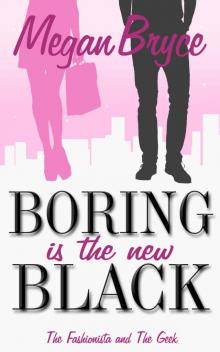 Boring Is The New Black (The Fashionista and The Geek Book 1)
Boring Is The New Black (The Fashionista and The Geek Book 1) It's Only Temporary - The Complete Collection
It's Only Temporary - The Complete Collection The Tie's The Limit (The Fashionista and The Geek Book 2)
The Tie's The Limit (The Fashionista and The Geek Book 2) The Reluctant Bride Collection - The Complete Box Set
The Reluctant Bride Collection - The Complete Box Set Some Like It Charming (A Temporary Engagement)
Some Like It Charming (A Temporary Engagement)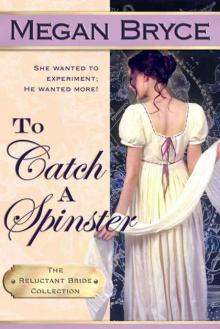 To Catch A Spinster (The Reluctant Bride Collection)
To Catch A Spinster (The Reluctant Bride Collection)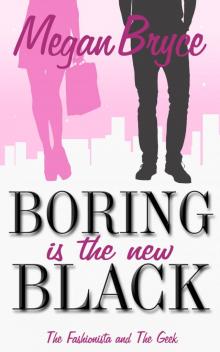 Boring Is The New Black
Boring Is The New Black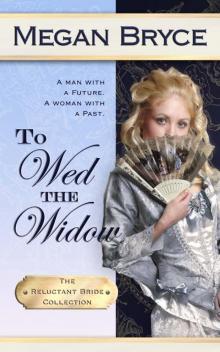 To Wed The Widow
To Wed The Widow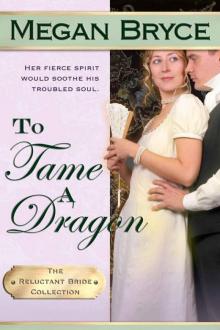 To Tame a Dragon
To Tame a Dragon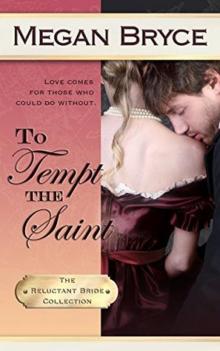 To Tempt the Saint
To Tempt the Saint The Reluctant Bride Collection
The Reluctant Bride Collection The Tie's The Limit
The Tie's The Limit Some Like It Hopeless (A Temporary Engagement)
Some Like It Hopeless (A Temporary Engagement)